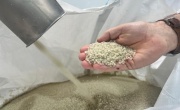Somerset votes for three-weekly waste collection scheme
Somerset is set to adopt a three-weekly residual waste collection scheme, after the Somerset Waste Board voted in favour of a new waste system designed to cut costs and increase recycling rates.
The new programme, ‘Recycle More’, will be rolled out to all districts in Somerset from Autumn 2017, and is expected to reduce total residual waste tonnages by 27 per cent.
 The changes were agreed after the board of the Somerset Waste Partnership (SWP), which comprises all Somerset councils working together to manage waste services in the county, met on Friday (16 December) to discuss a report proposing the service change.
The changes were agreed after the board of the Somerset Waste Partnership (SWP), which comprises all Somerset councils working together to manage waste services in the county, met on Friday (16 December) to discuss a report proposing the service change.
According to the report, created by Development and Monitoring Manager David Mansell, the move from Somerset’s current fortnightly service to a three-weekly refuse collection system is expected to result in almost 13,000 extra tonnes of recycling each year by limiting the amount of waste people can put out for collection.
When the county moved to weekly recycling and fortnightly waste collections, the report notes, recycling doubled and total waste arisings significantly reduced. Since that, however, a study on the composition of Somerset’s residual waste in November 2012 found that half of it could be recycled through current kerbside services, with recyclable food waste accounting for 29 per cent.
Although thecounty's recycling rate is currently at 52 per cent, some eight per cent higher than the English average, the Recycle More changes aim to increase recycling of all materials, allow more materials to be recycled, and reduce waste sent for costly waste disposal. The increased recycling will free up bin space to allow for the less frequent refuse collections.
To enable residents to make greater use of the weekly recycling and food waste service, the county’s weekly kerbside recycling collections will also accept extra materials, including plastic pots, tubs and trays, which were the most requested service improvement suggested by residents, as well as household batteries and small electrical items.
Savings made from reducing the operational costs, recycling more and reducing waste sent for disposal are expected to total £1.7 million per year before rollout costs.
The cost of implementing the new service, including new containers and vehicles suitable for collecting more materials, which will be covered by both the SWP and waste management contractor Kier, are estimated at approximately £2.2 million. The report suggests that these initial costs would be fully covered by savings achieved by the summer of 2019.
Commenting on the proposed changes, Somerset Waste Board chairman Cllr Derek Yeomans said: “Recycle More is a huge step forward for Somerset residents to maximise recycling, minimise residual waste, and make big savings to invest in other vital services.
“If people recycle all they can, including every scrap of food, they will have very few problems, but if anyone does face difficulties after Recycle More starts, they just need to ask their local council for advice or extra help.”
Trials show success
In 2014 trials of a number of different collection configurations in different Somerset areas, the proposed Recycle More scheme, with more recyclable materials and fewer residual waste collections, in Wiveliscombe, proved the most effective in increasing recycling and reducing refuse.
Before the trial, recycling performance on the Wiveliscombe rounds was slightly above the Somerset average. During the trial, the recycling of dry materials increased by 28 per cent, food waste recycling increased by 45 per cent and refuse reduced by 27 per cent.
Further, in a post-trial consultation with residents, over three-quarters (81 per cent) of respondents said the trial arrangements were better than the previous collections. Only six per cent said they were worse and 13 per cent said they were neither better nor worse.
Three-weekly waste collections are becoming more and more common across the UK, as councils attempt to increase recycling and chase service savings. In particular, several Welsh councils have turned to three-weekly collections to help them reach targets set by the Welsh Government, and much of Greater Manchester is now covered by three-weekly systems.
Four-weekly collections have even been implemented in Falkirk, which switched from a three-weekly collection in October. Conwy in Wales considered a monthly service earlier this year, but instead opted for a three-weekly option, with monthly trials taking place in areas of the county. A BBC Wales documentary programme Week In, Week Out last month visited residents taking part in the trial to see how they were coping.
The report delivered to the Somerset Waste Board last week can be viewed on the Somerset County Council website.









